Deck 5: Demand
Question
Question
Question
Question
Question
Question
Question
Question
Question
Question
Question
Question
Question
Question
Question
Question
Question
Question
Question
Question
Question
Question
Question
Question
Question
Question
Question
Question
Question
Question
Question
Question
Question
Question
Question
Question
Question
Question
Question
Question
Question
Question
Question
Question
Question
Question
Question
Question
Question
Question
Question
Question
Question
Question
Question
Question
Question
Question
Question
Question
Question
Question
Question
Question
Question
Question
Question
Question
Question
Question
Question
Question
Question
Question
Question
Question
Question
Question
Question
Question

Unlock Deck
Sign up to unlock the cards in this deck!
Unlock Deck
Unlock Deck
1/134
Play
Full screen (f)
Deck 5: Demand
1
After subsistence levels of food, shelter, and clothing have been provided, economists refer to all other goods and services as:
A)"inferior goods"
B)"needs"
C)"wants"
D)"luxuries"
A)"inferior goods"
B)"needs"
C)"wants"
D)"luxuries"
"wants"
2
As the price of computers falls, the quantity of computers demanded increases. This is an application of:
A)the law of supply
B)the production possibilities curve
C)the law of demand
D)needs versus wants
A)the law of supply
B)the production possibilities curve
C)the law of demand
D)needs versus wants
the law of demand
3
Joe is shopping for a new computer. A computer can be delivered to Joe's home for $1,200. Alternatively, Joe can pick up the same computer at the warehouse for $1,000. How should Joe buy the computer?
A)Joe should drive to the warehouse because $1,000 is less than $1,200.
B)Joe should drive to the warehouse if his cost of driving to the warehouse is less than $200.
C)Joe should drive to the warehouse if his cost of driving to the warehouse is greater than $200.
D)Joe should drive to the warehouse because the $200 he would save by driving to the warehouse is more than 10% of the purchase price.
A)Joe should drive to the warehouse because $1,000 is less than $1,200.
B)Joe should drive to the warehouse if his cost of driving to the warehouse is less than $200.
C)Joe should drive to the warehouse if his cost of driving to the warehouse is greater than $200.
D)Joe should drive to the warehouse because the $200 he would save by driving to the warehouse is more than 10% of the purchase price.
Joe should drive to the warehouse if his cost of driving to the warehouse is less than $200.
4
Shelter for homeless people is an example of
A)a want.
B)a need.
C)something they can live without.
D)something hard to find.
A)a want.
B)a need.
C)something they can live without.
D)something hard to find.

Unlock Deck
Unlock for access to all 134 flashcards in this deck.
Unlock Deck
k this deck
5
According to economists, the satisfaction people get from their consumption activities is called:
A)demand.
B)utility.
C)a need.
D)a want.
A)demand.
B)utility.
C)a need.
D)a want.

Unlock Deck
Unlock for access to all 134 flashcards in this deck.
Unlock Deck
k this deck
6
Sven likes to water ski, but can only water ski during the one week each year when he is on vacation. Therefore, he plans to ski every day, for eight hours a day. The first day, Sven skied for eight hours and enjoyed every hour. The second day, Sven slept in and then skied for seven hours, which was fun but not as much fun as the first day. The third day, Sven skied for six hours, but was starting to get a bit bored by the end. The fourth day, Sven skied for four hours and then took a nap. On the fifth day of Sven's vacation, Sven went blueberry picking all day. On the fifth day of Sven's vacation, he had decided that another hour of skiing would yield:
A)more utility than blueberry picking.
B)the same level of utility as the day before.
C)less utility than blueberry picking.
D)no utility at all.
A)more utility than blueberry picking.
B)the same level of utility as the day before.
C)less utility than blueberry picking.
D)no utility at all.

Unlock Deck
Unlock for access to all 134 flashcards in this deck.
Unlock Deck
k this deck
7
The tendency for consumers to purchase more of a good or service as its price falls is captured by:
A)the law of supply.
B)the law of increasing cost.
C)the Low-Hanging Fruit Principle.
D)the law of demand.
A)the law of supply.
B)the law of increasing cost.
C)the Low-Hanging Fruit Principle.
D)the law of demand.

Unlock Deck
Unlock for access to all 134 flashcards in this deck.
Unlock Deck
k this deck
8
During Thanksgiving you participated in a pumpkin-pie eating contest. You really enjoyed the first two pies, the third one was okay, but as soon as you ate the fourth one you became ill and lost the contest. Your total utility ______ with the first three pies you ate.
A)increased
B)decreased
C)stayed the same
D)first increased than decreased
A)increased
B)decreased
C)stayed the same
D)first increased than decreased

Unlock Deck
Unlock for access to all 134 flashcards in this deck.
Unlock Deck
k this deck
9
Sven likes to water ski, but can only water ski during the one week each year when he is on vacation. Therefore, he plans to ski every day, for eight hours a day. The first day, Sven skied for eight hours and enjoyed every hour. The second day, Sven slept in and then skied for seven hours, which was fun but not as much fun as the first day. The third day, Sven skied for six hours, but was starting to get a bit bored by the end. The fourth day, Sven skied for four hours and then took a nap. On the fifth day of Sven's vacation, Sven went blueberry picking all day. Sven's total utility ______ with each hour that he skied.
A)increased
B)decreased
C)remained constant
D)first increased than decreased
A)increased
B)decreased
C)remained constant
D)first increased than decreased

Unlock Deck
Unlock for access to all 134 flashcards in this deck.
Unlock Deck
k this deck
10
The goal of utility maximization is to allocate your ______ in order to maximize your ______.
A)utility; spending
B)resources; satisfaction
C)time; work
D)resources; desires
A)utility; spending
B)resources; satisfaction
C)time; work
D)resources; desires

Unlock Deck
Unlock for access to all 134 flashcards in this deck.
Unlock Deck
k this deck
11
During Thanksgiving you participated in a pumpkin-pie eating contest. You really enjoyed the first two pies, the third one was okay, but as soon as you ate the fourth one you became ill and lost the contest. After the third pie, your total utility
A)increased, but by less than for the first three pies.
B)decreased.
C)stayed the same.
D)was zero.
A)increased, but by less than for the first three pies.
B)decreased.
C)stayed the same.
D)was zero.

Unlock Deck
Unlock for access to all 134 flashcards in this deck.
Unlock Deck
k this deck
12
Taking a limousine to a five star restaurant in New York is a:
A)necessity to Donald Trump but a luxury to Joe Average.
B)necessity to both Joe Average and Donald Trump.
C)want to both Joe Average and Donald Trump.
D)want to Donald Trump and a luxury to Joe Average.
A)necessity to Donald Trump but a luxury to Joe Average.
B)necessity to both Joe Average and Donald Trump.
C)want to both Joe Average and Donald Trump.
D)want to Donald Trump and a luxury to Joe Average.

Unlock Deck
Unlock for access to all 134 flashcards in this deck.
Unlock Deck
k this deck
13
According to the law of demand, when the price of shoes ______ people will consume ______ shoes.
A)rises; more
B)falls; more
C)rises; the same amount
D)falls; the same amount
A)rises; more
B)falls; more
C)rises; the same amount
D)falls; the same amount

Unlock Deck
Unlock for access to all 134 flashcards in this deck.
Unlock Deck
k this deck
14
During Thanksgiving you participated in a pumpkin-pie eating contest. You really enjoyed the first two pies, the third one was okay, but as soon as you ate the fourth one you became ill and lost the contest. You got ______ utility from eating the first pie than from eating the third pie.
A)less
B)more
C)the same amount of
D)less variable
A)less
B)more
C)the same amount of
D)less variable

Unlock Deck
Unlock for access to all 134 flashcards in this deck.
Unlock Deck
k this deck
15
Growing rice requires extensive irrigation in California. Economists consider water to be a (n) ______ for rice farmers in California.
A)want
B)need
C)luxury
D)inferior good
A)want
B)need
C)luxury
D)inferior good

Unlock Deck
Unlock for access to all 134 flashcards in this deck.
Unlock Deck
k this deck
16
In most markets, scarce goods or services are rationed among competing users using:
A)non-monetary prices
B)monetary prices
C)government organizations
D)private organizations
A)non-monetary prices
B)monetary prices
C)government organizations
D)private organizations

Unlock Deck
Unlock for access to all 134 flashcards in this deck.
Unlock Deck
k this deck
17
In some countries, medical care is provided free-of-charge to citizens and is paid for by the government. In those countries, medical care:
A)is not a scarce resource.
B)is available at zero opportunity cost.
C)is rationed by some non-monetary method.
D)does not exhibit diminishing marginal returns.
A)is not a scarce resource.
B)is available at zero opportunity cost.
C)is rationed by some non-monetary method.
D)does not exhibit diminishing marginal returns.

Unlock Deck
Unlock for access to all 134 flashcards in this deck.
Unlock Deck
k this deck
18
The law of demand indicates that as the cost of an activity:
A)falls, less of the activity will occur.
B)rises, more of the activity will occur.
C)rises, the level of the activity may or may not increase depending on the individual.
D)rises, less of the activity will occur.
A)falls, less of the activity will occur.
B)rises, more of the activity will occur.
C)rises, the level of the activity may or may not increase depending on the individual.
D)rises, less of the activity will occur.

Unlock Deck
Unlock for access to all 134 flashcards in this deck.
Unlock Deck
k this deck
19
Higher education is a ______ and assigned textbooks are ______.
A)need; needs
B)want; wants
C)need; wants
D)want; needs
A)need; needs
B)want; wants
C)need; wants
D)want; needs

Unlock Deck
Unlock for access to all 134 flashcards in this deck.
Unlock Deck
k this deck
20
During Thanksgiving you participated in a pumpkin-pie eating contest. You really enjoyed the first two pies, the third one was okay, but as soon as you ate the fourth one you became ill and lost the contest. You got ______ utility from eating the fourth pie than from eating the second pie.
A)less
B)more
C)the same amount of
D)less variable
A)less
B)more
C)the same amount of
D)less variable

Unlock Deck
Unlock for access to all 134 flashcards in this deck.
Unlock Deck
k this deck
21
Pat's total utility after eating 99 Reese's Peanut Butter Cups was greater than his total utility after eating 100 Reese's Peanut Butter Cups. Therefore, Pat's marginal utility from the 100th peanut butter cup was:
A)positive, but less than one.
B)positive, but less than his marginal utility for the 99th peanut butter cup.
C)zero.
D)negative.
A)positive, but less than one.
B)positive, but less than his marginal utility for the 99th peanut butter cup.
C)zero.
D)negative.

Unlock Deck
Unlock for access to all 134 flashcards in this deck.
Unlock Deck
k this deck
22
Sven likes to water ski, but can only water ski during the one week each year when he is on vacation. Therefore, he plans to ski every day, for eight hours a day. The first day, Sven skied for eight hours and enjoyed every hour. The second day, Sven slept in and then skied for seven hours, which was fun but not as much fun as the first day. The third day, Sven skied for six hours, but was starting to get a bit bored by the end. The fourth day, Sven skied for four hours and then took a nap. On the fifth day of Sven's vacation, Sven went blueberry picking all day. Sven's vacation convinced him that:
A)even for activities he really enjoys, diminishing marginal utility eventually sets in.
B)blueberry picking yields higher total utility than does water skiing.
C)even for activities he really enjoys, total utility declines over time.
D)economic theory applies to things you buy, but not to recreational activities.
A)even for activities he really enjoys, diminishing marginal utility eventually sets in.
B)blueberry picking yields higher total utility than does water skiing.
C)even for activities he really enjoys, total utility declines over time.
D)economic theory applies to things you buy, but not to recreational activities.

Unlock Deck
Unlock for access to all 134 flashcards in this deck.
Unlock Deck
k this deck
23
Laura's total utility from consuming 8, 9, and 10 bonbons is 35, 42, and 45, respectively. Her marginal utility from the 9th bonbon is
A)42.
B)77.
C)7.
D)4.67.
A)42.
B)77.
C)7.
D)4.67.

Unlock Deck
Unlock for access to all 134 flashcards in this deck.
Unlock Deck
k this deck
24
Sven likes to water ski, but can only water ski during the one week each year when he is on vacation. Therefore, he plans to ski every day, for eight hours a day. The first day, Sven skied for eight hours and enjoyed every hour. The second day, Sven slept in and then skied for seven hours, which was fun but not as much fun as the first day. The third day, Sven skied for six hours, but was starting to get a bit bored by the end. The fourth day, Sven skied for four hours and then took a nap. On the fifth day of Sven's vacation, Sven went blueberry picking all day. Sven's marginal utility from his first hour of skiing was ______ his marginal utility from his tenth hour of skiing.
A)less than
B)greater than
C)the same as
D)more negative
A)less than
B)greater than
C)the same as
D)more negative

Unlock Deck
Unlock for access to all 134 flashcards in this deck.
Unlock Deck
k this deck
25
It is impossible for total utility to be ______ when marginal utility is ______.
A)increasing; increasing
B)decreasing; positive
C)positive; negative
D)increasing; decreasing
A)increasing; increasing
B)decreasing; positive
C)positive; negative
D)increasing; decreasing

Unlock Deck
Unlock for access to all 134 flashcards in this deck.
Unlock Deck
k this deck
26
Donald has vast riches and consumes thousands of dollars' worth of consumer goods each week, yet he is never satisfied. Why not?
A)People's wants are unlimited.
B)Donald fails to choose rationally.
C)The law of diminishing marginal utility shows that consuming too many material goods lowers total utility.
D)Utility is unrelated to the level of consumption.
A)People's wants are unlimited.
B)Donald fails to choose rationally.
C)The law of diminishing marginal utility shows that consuming too many material goods lowers total utility.
D)Utility is unrelated to the level of consumption.

Unlock Deck
Unlock for access to all 134 flashcards in this deck.
Unlock Deck
k this deck
27
Refer to the figure below. The marginal utility of the 4th dinner out per week is
A)75.
B)60.
C)250.
D)15.
A)75.
B)60.
C)250.
D)15.

Unlock Deck
Unlock for access to all 134 flashcards in this deck.
Unlock Deck
k this deck
28
Refer to the figure below. The marginal utility of the 6th pizza is: 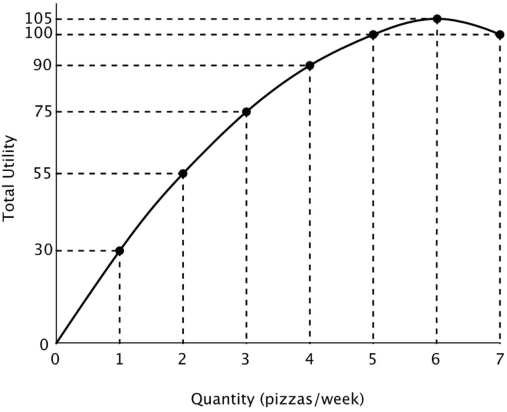
A)95
B)100
C)5
D)17.5

A)95
B)100
C)5
D)17.5

Unlock Deck
Unlock for access to all 134 flashcards in this deck.
Unlock Deck
k this deck
29
Refer to the figure below. The marginal utility of the 3rd dinner is
A)60.
B)75.
C)135.
D)160.
A)60.
B)75.
C)135.
D)160.

Unlock Deck
Unlock for access to all 134 flashcards in this deck.
Unlock Deck
k this deck
30
Refer to the figure below. The total utility of consuming two dinners out per week is:
A)less than 100.
B)75.
C)175.
D)160.
A)less than 100.
B)75.
C)175.
D)160.

Unlock Deck
Unlock for access to all 134 flashcards in this deck.
Unlock Deck
k this deck
31
If marginal utility is positive, then as consumption increases:
A)the consumer will not experience diminishing marginal utility.
B)total utility will not change.
C)total utility will increase.
D)the demand curve will have a positive slope.
A)the consumer will not experience diminishing marginal utility.
B)total utility will not change.
C)total utility will increase.
D)the demand curve will have a positive slope.

Unlock Deck
Unlock for access to all 134 flashcards in this deck.
Unlock Deck
k this deck
32
Refer to the figure below. The total utility of consuming two pizzas a week is: 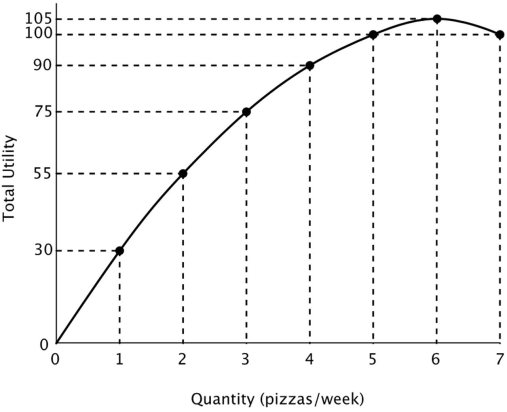
A)25
B)30
C)55
D)75

A)25
B)30
C)55
D)75

Unlock Deck
Unlock for access to all 134 flashcards in this deck.
Unlock Deck
k this deck
33
The additional utility gained from consuming an additional unit of a good is called:
A)total utility
B)marginal utility
C)costly utility
D)an util
A)total utility
B)marginal utility
C)costly utility
D)an util

Unlock Deck
Unlock for access to all 134 flashcards in this deck.
Unlock Deck
k this deck
34
The term marginal utility denotes the amount by which ______ changes when consumption changes by ______ unit(s).
A)total utility; 1
B)demand; 10
C)demand; 1
D)total utility; 10
A)total utility; 1
B)demand; 10
C)demand; 1
D)total utility; 10

Unlock Deck
Unlock for access to all 134 flashcards in this deck.
Unlock Deck
k this deck
35
For Michael, the first cup of coffee he drinks every morning is heavenly. The second one is pretty good, but not as good as the first, and if he drinks a third cup he feels jittery and sick. For Michael, the marginal utility from drinking a cup of coffee is clearly:
A)decreasing.
B)increasing.
C)positive.
D)negative.
A)decreasing.
B)increasing.
C)positive.
D)negative.

Unlock Deck
Unlock for access to all 134 flashcards in this deck.
Unlock Deck
k this deck
36
Refer to the figure below. Total utility increases with each additional pizza up to the ______ and then declines, but marginal utility ______ with each additional pizza consumed. 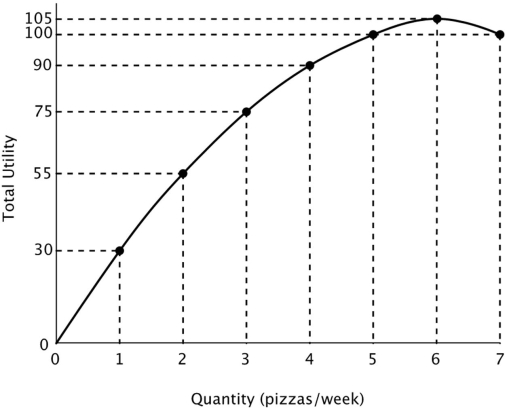
A)7th pizza; increases
B)6th pizza; increases
C)5th pizza; stays the same
D)6th pizza; decreases

A)7th pizza; increases
B)6th pizza; increases
C)5th pizza; stays the same
D)6th pizza; decreases

Unlock Deck
Unlock for access to all 134 flashcards in this deck.
Unlock Deck
k this deck
37
Refer to the figure below. The total utility of consuming 4 pizzas a week is: 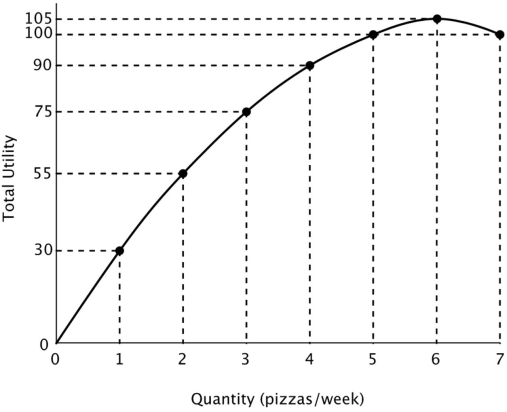
A)15
B)22.5
C)75
D)90

A)15
B)22.5
C)75
D)90

Unlock Deck
Unlock for access to all 134 flashcards in this deck.
Unlock Deck
k this deck
38
Suppose Chris's marginal utility from the first taco he eats is 15, and his marginal utility from the second taco he eats is 12. One can infer that:
A)Chris's total utility from eating two tacos is 27.
B)Chris should eat one taco.
C)Chris's average utility from eating two tacos is 27.
D)Chris should eat two tacos.
A)Chris's total utility from eating two tacos is 27.
B)Chris should eat one taco.
C)Chris's average utility from eating two tacos is 27.
D)Chris should eat two tacos.

Unlock Deck
Unlock for access to all 134 flashcards in this deck.
Unlock Deck
k this deck
39
Refer to the figure below. The marginal utility of the 7th pizza is 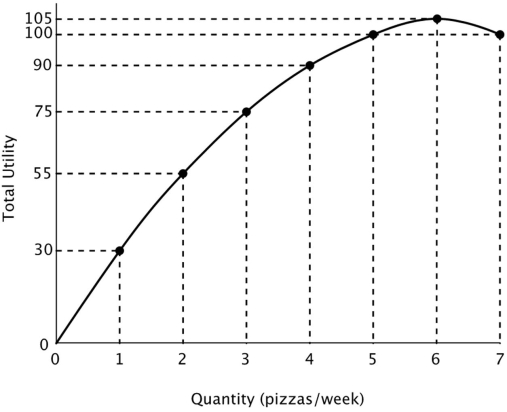
A)100.
B)5.
C)-100.
D)-5.

A)100.
B)5.
C)-100.
D)-5.

Unlock Deck
Unlock for access to all 134 flashcards in this deck.
Unlock Deck
k this deck
40
As Lynn eats more pizza, we would typically expect her marginal utility from eating pizza to:
A)increase.
B)decrease.
C)stay the same.
D)equal the price of pizza.
A)increase.
B)decrease.
C)stay the same.
D)equal the price of pizza.

Unlock Deck
Unlock for access to all 134 flashcards in this deck.
Unlock Deck
k this deck
41
Refer to the figure below. Total utility ______ as additional apples are consumed, but marginal utility ______ with each additional apple consumed.
A)first decreases then increases; decreases
B)first increases then decreases; decreases
C)first decreases then increases; increases
D)first increases then decreases; increases
A)first decreases then increases; decreases
B)first increases then decreases; decreases
C)first decreases then increases; increases
D)first increases then decreases; increases

Unlock Deck
Unlock for access to all 134 flashcards in this deck.
Unlock Deck
k this deck
42
Assume that Dusty has $30 in income, the price of a loaf of bread is $1.50, and the price of a jar of peanut butter is $3. Suppose that at the original income of $30, the price of a loaf of bread increased to $3 and the price of a jar of peanut butter decreased to $2. Dusty can buy a maximum of ______ loaves of bread or a maximum of ______ jars of peanut butter.
A)10; 15
B)15; 10
C)20; 15
D)15; 20
A)10; 15
B)15; 10
C)20; 15
D)15; 20

Unlock Deck
Unlock for access to all 134 flashcards in this deck.
Unlock Deck
k this deck
43
The tendency for marginal utility to decline as consumption increases beyond some point is called:
A)the law of demand
B)the law of diminishing marginal utility
C)the rational spending rule
D)utility maximization
A)the law of demand
B)the law of diminishing marginal utility
C)the rational spending rule
D)utility maximization

Unlock Deck
Unlock for access to all 134 flashcards in this deck.
Unlock Deck
k this deck
44
Refer to the figure below. For Jeff, the consumption of movies reflects the law of: 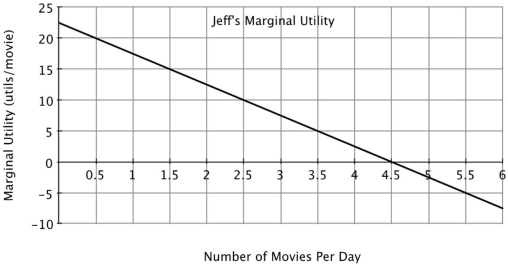
A)demand.
B)diminishing marginal utility.
C)total utility maximization.
D)marginal utility maximization.

A)demand.
B)diminishing marginal utility.
C)total utility maximization.
D)marginal utility maximization.

Unlock Deck
Unlock for access to all 134 flashcards in this deck.
Unlock Deck
k this deck
45
The ______ combination of goods is combination that yields the highest total utility given a consumer's income.
A)affordable
B)economical
C)utility satiating
D)optimal
A)affordable
B)economical
C)utility satiating
D)optimal

Unlock Deck
Unlock for access to all 134 flashcards in this deck.
Unlock Deck
k this deck
46
Assume that Dusty has $30 in income, the price of a loaf of bread is $1.50, and the price of a jar of peanut butter is $3. At the original income of $30, if the price of a loaf of bread decreased to $1 and the price of a jar of peanut butter increased to $5, then Dusty could buy a maximum of ______ loaves of bread or a maximum of ______ jars of peanut butter.
A)20; 5
B)5; 20
C)30; 6
D)6; 30
A)20; 5
B)5; 20
C)30; 6
D)6; 30

Unlock Deck
Unlock for access to all 134 flashcards in this deck.
Unlock Deck
k this deck
47
Assume that Dusty has $30 in income, the price of a loaf of bread is $1.50, and the price of a jar of peanut butter is $3. Dusty can buy a maximum of ______ loaves of bread or a maximum of ______ jars of peanut butter.
A)20; 10
B)15; 15
C)10; 20
D)10; 5
A)20; 10
B)15; 15
C)10; 20
D)10; 5

Unlock Deck
Unlock for access to all 134 flashcards in this deck.
Unlock Deck
k this deck
48
Casey earns $150 a week and consumes only fish and shrimp. The price of fish is $3 a pound and the price of shrimp is $5 a pound. If Casey's income rises to $210, he could buy a maximum of ______ pounds of fish or a maximum of ______ pounds of shrimp.
A)30; 24
B)24; 30
C)70; 42
D)42; 70
A)30; 24
B)24; 30
C)70; 42
D)42; 70

Unlock Deck
Unlock for access to all 134 flashcards in this deck.
Unlock Deck
k this deck
49
Refer to the figure below. When Jeff goes from watching 3 to 4 movies a day, his total utility: 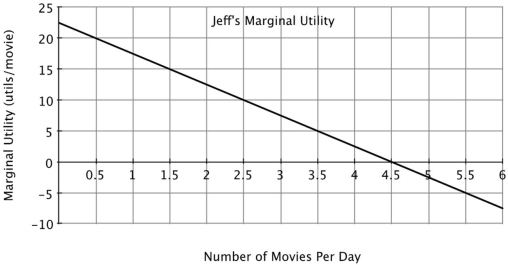
A)increases.
B)decreases.
C)does not change.
D)gets close to zero.

A)increases.
B)decreases.
C)does not change.
D)gets close to zero.

Unlock Deck
Unlock for access to all 134 flashcards in this deck.
Unlock Deck
k this deck
50
According to the law of diminishing marginal utility:
A)as you consume less of something, your total utility will decrease.
B)as you consume less of something, your marginal utility from consuming that good will increase.
C)you should never consume more of something if your marginal utility is decreasing.
D)if your total utility is increasing as you consume more of something, then your marginal utility must be increasing as well.
A)as you consume less of something, your total utility will decrease.
B)as you consume less of something, your marginal utility from consuming that good will increase.
C)you should never consume more of something if your marginal utility is decreasing.
D)if your total utility is increasing as you consume more of something, then your marginal utility must be increasing as well.

Unlock Deck
Unlock for access to all 134 flashcards in this deck.
Unlock Deck
k this deck
51
Refer to the figure below. The marginal utility of consuming the 2nd apple is:
A)10
B)15
C)20
D)35
A)10
B)15
C)20
D)35

Unlock Deck
Unlock for access to all 134 flashcards in this deck.
Unlock Deck
k this deck
52
If the marginal utility of the 3rd cup of coffee is 23 and the marginal utility of the 4th cup is 15, then:
A)it is optimal for the consumer to have 3 cups of coffee.
B)the price of a cup of coffee must be relatively low.
C)it is optimal for the consumer to have 4 cups of coffee.
D)there is evidence of diminishing marginal utility.
A)it is optimal for the consumer to have 3 cups of coffee.
B)the price of a cup of coffee must be relatively low.
C)it is optimal for the consumer to have 4 cups of coffee.
D)there is evidence of diminishing marginal utility.

Unlock Deck
Unlock for access to all 134 flashcards in this deck.
Unlock Deck
k this deck
53
Casey earns $150 a week and consumes only fish and shrimp. The price of fish is $3 a pound and the price of shrimp is $5 a pound. Casey can buy a maximum of ______ pounds of fish or a maximum of ______ pounds of shrimp.
A)30; 50
B)50; 30
C)15; 30
D)30; 15
A)30; 50
B)50; 30
C)15; 30
D)30; 15

Unlock Deck
Unlock for access to all 134 flashcards in this deck.
Unlock Deck
k this deck
54
Refer to the figure below. The marginal utility of the 5th apple is:
A)-5
B)0
C)5
D)45
A)-5
B)0
C)5
D)45

Unlock Deck
Unlock for access to all 134 flashcards in this deck.
Unlock Deck
k this deck
55
Assume that Dusty has $30 in income, the price of a loaf of bread is $1.50, and the price of a jar of peanut butter is $3. If Dusty's income rises to $45, Dusty can now buy a maximum of ______ loaves of bread or a maximum of ______ jars of peanut butter.
A)5; 25
B)10; 40
C)15; 30
D)30; 15
A)5; 25
B)10; 40
C)15; 30
D)30; 15

Unlock Deck
Unlock for access to all 134 flashcards in this deck.
Unlock Deck
k this deck
56
Refer to the figure below. The marginal utility of apples is:
A)constant.
B)first increasing, but decreasing after the fourth apple.
C)decreasing after the first apple.
D)constantly increasing.
A)constant.
B)first increasing, but decreasing after the fourth apple.
C)decreasing after the first apple.
D)constantly increasing.

Unlock Deck
Unlock for access to all 134 flashcards in this deck.
Unlock Deck
k this deck
57
If Terry's total utility is maximized when he owns 10 pairs of shoes, then Terry's total utility from owning 7 pairs of shoes is ______ Terry's total utility from owning 8 pairs.
A)greater than
B)equal to
C)less than
D)less than or equal to
A)greater than
B)equal to
C)less than
D)less than or equal to

Unlock Deck
Unlock for access to all 134 flashcards in this deck.
Unlock Deck
k this deck
58
Refer to the figure below. As Jeff watches more movies, his marginal utility: 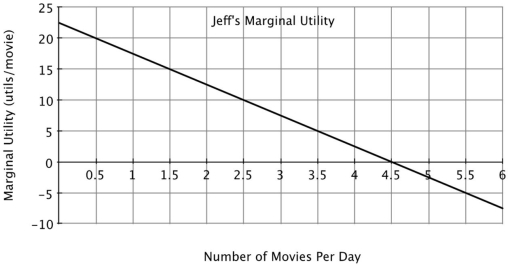
A)gets larger
B)gets smaller
C)does not change
D)gets close to one

A)gets larger
B)gets smaller
C)does not change
D)gets close to one

Unlock Deck
Unlock for access to all 134 flashcards in this deck.
Unlock Deck
k this deck
59
Casey earns $150 a week and consumes only fish and shrimp. The price of fish is $3 a pound and the price of shrimp is $5 a pound. Suppose the price of fish decreased to $1.50 a pound, and the price of shrimp remains $5 a pound. At Casey's original income of $150 per week, Casey can now buy a maximum of ______ pounds fish or a maximum of ______ pounds shrimp.
A)10; 30
B)30; 50
C)30; 100
D)100; 30
A)10; 30
B)30; 50
C)30; 100
D)100; 30

Unlock Deck
Unlock for access to all 134 flashcards in this deck.
Unlock Deck
k this deck
60
Cory gets 18, 23, and 25 units worth of total utility from consuming 10, 11, and 12 raw oysters, respectively, and the price per oyster is 25 cents. Thus, one can infer that Cory:
A)is not maximizing his utility.
B)is experiencing diminishing marginal utility.
C)should not consume any more oysters.
D)has consumed too many oysters.
A)is not maximizing his utility.
B)is experiencing diminishing marginal utility.
C)should not consume any more oysters.
D)has consumed too many oysters.

Unlock Deck
Unlock for access to all 134 flashcards in this deck.
Unlock Deck
k this deck
61
Suppose that Coke and Sprite each sell for $2 a can. Each month Joe buys 6 cans of Sprite and 30 cans of Coke. From this we can infer that:
A)Joe is buying too many cans of Sprite.
B)Joe is buying too many cans of Coke.
C)Joe is maximizing his utility if his marginal utility from the 6th can of Sprite he buys is less than his marginal utility from the 30th can of Coke he buys.
D)Joe is maximizing his utility if his marginal utility from the 6th can of Sprite he buys is equal to his marginal utility from the 30th can of Coke he buys.
A)Joe is buying too many cans of Sprite.
B)Joe is buying too many cans of Coke.
C)Joe is maximizing his utility if his marginal utility from the 6th can of Sprite he buys is less than his marginal utility from the 30th can of Coke he buys.
D)Joe is maximizing his utility if his marginal utility from the 6th can of Sprite he buys is equal to his marginal utility from the 30th can of Coke he buys.

Unlock Deck
Unlock for access to all 134 flashcards in this deck.
Unlock Deck
k this deck
62
Purchasing goods such that the ratio of marginal utility to price is equal across all goods results in the:
A)greatest total utility.
B)lowest expenditure.
C)greatest marginal utility.
D)same expenditure on all goods.
A)greatest total utility.
B)lowest expenditure.
C)greatest marginal utility.
D)same expenditure on all goods.

Unlock Deck
Unlock for access to all 134 flashcards in this deck.
Unlock Deck
k this deck
63
Taylor's marginal utility from watching movies and from eating out (in utils) is shown below. Taylor spends exactly $100 every month on these two forms of entertainment, and the price of each movie is $10 and the price of each dinner is $20. If Taylor watches 2 movies a month, Taylor will eat out ______ times per month, and have marginal utility per dollar of ______ from movies and a marginal utility per dollar of ______ from eating out.
A)3; 5; 6
B)2; 5; 7
C)4; 5; 5
D)4; 4; 6
A)3; 5; 6
B)2; 5; 7
C)4; 5; 5
D)4; 4; 6

Unlock Deck
Unlock for access to all 134 flashcards in this deck.
Unlock Deck
k this deck
64
If a consumer buys two goods, the rational spending rule requires that the:
A)total expenditure on the two goods be equal.
B)ratio of total utility to price be equal for the two goods.
C)ratio of average utility to price be equal for the two goods.
D)ratio of marginal utility to price be equal for the two goods.
A)total expenditure on the two goods be equal.
B)ratio of total utility to price be equal for the two goods.
C)ratio of average utility to price be equal for the two goods.
D)ratio of marginal utility to price be equal for the two goods.

Unlock Deck
Unlock for access to all 134 flashcards in this deck.
Unlock Deck
k this deck
65
Jamie's marginal utility from muffins and from doughnuts (in utils) is shown below. Jamie spends a total of $8 on muffins and/or doughnuts every morning. The price of each muffin is $2 and the price of each doughnut is $1. If Jamie consumes 3 muffins a day, then what is her marginal utility per dollar spent on the third muffin?
A)10
B)20
C)30
D)40
A)10
B)20
C)30
D)40

Unlock Deck
Unlock for access to all 134 flashcards in this deck.
Unlock Deck
k this deck
66
For two goods, A and B, the rational spending rule is expressed as:
A)MUA = MUB.
B)MUA * MUB = PA * PB.
C)(MUA/PB) = (MUB/PA).
D)(MUA/PA) = (MUB/PB).
A)MUA = MUB.
B)MUA * MUB = PA * PB.
C)(MUA/PB) = (MUB/PA).
D)(MUA/PA) = (MUB/PB).

Unlock Deck
Unlock for access to all 134 flashcards in this deck.
Unlock Deck
k this deck
67
Suppose that at Miles's current level of consumption, his marginal utility from a pizza is 10 utils, and his marginal utility from a pint of ice cream is 16 utils. If the price of a pizza is $8, and the price of a pint of ice cream is $5, is Miles maximizing his utility?
A)No.He should shift his spending away from ice cream and towards frozen pizza.
B)No.He should buy less frozen pizza and less ice cream.
C)No.He should shift his spending away from frozen pizza and towards ice cream.
D)Yes.He should not change his spending on frozen pizza and ice cream.
A)No.He should shift his spending away from ice cream and towards frozen pizza.
B)No.He should buy less frozen pizza and less ice cream.
C)No.He should shift his spending away from frozen pizza and towards ice cream.
D)Yes.He should not change his spending on frozen pizza and ice cream.

Unlock Deck
Unlock for access to all 134 flashcards in this deck.
Unlock Deck
k this deck
68
Suppose that Fiona spends all of her income on 10 units of good X and 14 units of good Y. Fiona's marginal utility from the 10th unit of good X is 24 utils, and her marginal utility from the 14th unit of good Y is 20 utils. If the price of good X is $8 per unit and the price of good Y is $5 per unit, then to comply with the rational spending rule, Fiona should:
A)purchase more than 10 units of good X and less than 14 units of Y.
B)purchase less than 10 units of good X and more than 14 units of good Y.
C)purchase more than 10 units of good X and more than 14 units of good Y.
D)continue to purchase 10 units of good X and 14 units of good Y.
A)purchase more than 10 units of good X and less than 14 units of Y.
B)purchase less than 10 units of good X and more than 14 units of good Y.
C)purchase more than 10 units of good X and more than 14 units of good Y.
D)continue to purchase 10 units of good X and 14 units of good Y.

Unlock Deck
Unlock for access to all 134 flashcards in this deck.
Unlock Deck
k this deck
69
Taylor's marginal utility from watching movies and from eating out (in utils) is shown below. Taylor spends exactly $100 every month on these two forms of entertainment, and the price of each movie is $10 and the price of each dinner is $20. If Taylor eats out 3 times a month, Taylor will watch ______ movies, and have marginal utility per dollar of ______ from eating out and a marginal utility per dollar of ______ from going to the movies.
A)4; 6; 2
B)3; 2; 6
C)4; 6; 1/2
D)3; 4; 4
A)4; 6; 2
B)3; 2; 6
C)4; 6; 1/2
D)3; 4; 4

Unlock Deck
Unlock for access to all 134 flashcards in this deck.
Unlock Deck
k this deck
70
Jamie's marginal utility from muffins and from doughnuts (in utils) is shown below. Jamie spends a total of $8 on muffins and/or doughnuts every morning. The price of each muffin is $2 and the price of each doughnut is $1. What is Jamie's optimal combination of muffins and doughnuts each day?
A)1 muffin, 6 doughnuts
B)2 muffins, 4 doughnuts
C)3 muffins, 2 doughnuts
D)4 muffins, zero doughnuts
A)1 muffin, 6 doughnuts
B)2 muffins, 4 doughnuts
C)3 muffins, 2 doughnuts
D)4 muffins, zero doughnuts

Unlock Deck
Unlock for access to all 134 flashcards in this deck.
Unlock Deck
k this deck
71
Suppose that each week Henry buys 12 peaches and 3 apples at his local farmer's market. Both kinds of fruit cost $1 each. From this we can infer that:
A)Henry is not maximizing his utility.
B)if Henry is maximizing his utility, then his marginal utility from the 12th peach he buys must be greater than his marginal utility from the 3rd apple he buys.
C)if Henry is maximizing his utility, then his marginal utility from the 12th peach he buys must equal his marginal utility from the 3rd apple he buys.
D)for Henry the law of diminishing marginal utility does not apply to peaches.
A)Henry is not maximizing his utility.
B)if Henry is maximizing his utility, then his marginal utility from the 12th peach he buys must be greater than his marginal utility from the 3rd apple he buys.
C)if Henry is maximizing his utility, then his marginal utility from the 12th peach he buys must equal his marginal utility from the 3rd apple he buys.
D)for Henry the law of diminishing marginal utility does not apply to peaches.

Unlock Deck
Unlock for access to all 134 flashcards in this deck.
Unlock Deck
k this deck
72
At his current level of consumption, Cameron get 3 times more marginal utility from an additional game of pinball than from an additional game of ping pong. If the price of a ping pong game is $0.50, then he is maximizing utility if the price of a pinball game is:
A)$1.00
B)$1.50
C)$2.00
D)$3.00
A)$1.00
B)$1.50
C)$2.00
D)$3.00

Unlock Deck
Unlock for access to all 134 flashcards in this deck.
Unlock Deck
k this deck
73
Suppose a cup of tea costs $0.60 and a scone costs $1.20. If Edith spends all of her income on these two goods, and at her current level of consumption, she receives a marginal utility of 6 utils from the last cup of tea she buys and a marginal utility of 24 utils from the last scone she buys, then Edith should:
A)buy more tea and fewer scones.
B)buy less tea and more scones.
C)not change her consumption of tea and scones.
D)buy more tea and more scones.
A)buy more tea and fewer scones.
B)buy less tea and more scones.
C)not change her consumption of tea and scones.
D)buy more tea and more scones.

Unlock Deck
Unlock for access to all 134 flashcards in this deck.
Unlock Deck
k this deck
74
Taylor's marginal utility from watching movies and from eating out (in utils) is shown below. Taylor spends exactly $100 every month on these two forms of entertainment, and the price of each movie is $10 and the price of each dinner is $20. Taylor's optimal combination of movies and eating out is:
A)3 movies and 3 dinners.
B)4 movies and 3 dinners.
C)3 movies and 4 dinners.
D)2 movies and 4 dinners.
A)3 movies and 3 dinners.
B)4 movies and 3 dinners.
C)3 movies and 4 dinners.
D)2 movies and 4 dinners.

Unlock Deck
Unlock for access to all 134 flashcards in this deck.
Unlock Deck
k this deck
75
Suppose that Cathy spends all of her income on 20 units of good X and 25 units of good Y. Cathy's marginal utility from the 20th unit of good X is 9 utils, and her marginal utility from the 25th unit of good Y is 19 utils. If the price of good X is $0.50 per unit and the price of good Y is $1.00 per unit, then to comply with the rational spending rule, Cathy should:
A)purchase more than 20 units of good X and less than 25 units of Y.
B)purchase less than 20 units of good X and more than 25 units of good Y.
C)purchase more than 20 units of good X and more than 25 units of good Y.
D)continue to purchase 20 units of good X and 25 units of good Y.
A)purchase more than 20 units of good X and less than 25 units of Y.
B)purchase less than 20 units of good X and more than 25 units of good Y.
C)purchase more than 20 units of good X and more than 25 units of good Y.
D)continue to purchase 20 units of good X and 25 units of good Y.

Unlock Deck
Unlock for access to all 134 flashcards in this deck.
Unlock Deck
k this deck
76
Let MUc denote the marginal utility that Pablo receives from a cup of coffee, and let pc denote the price of a cup of coffee. We typically expect that as Pablo buys more coffee:
A)MUc/pc will rise
B)MUc/pc will fall
C)MUc/pc will not change
D)MUc and pc will both fall
A)MUc/pc will rise
B)MUc/pc will fall
C)MUc/pc will not change
D)MUc and pc will both fall

Unlock Deck
Unlock for access to all 134 flashcards in this deck.
Unlock Deck
k this deck
77
Jamie's marginal utility from muffins and from doughnuts (in utils) is shown below. Jamie spends a total of $8 on muffins and/or doughnuts every morning. The price of each muffin is $2 and the price of each doughnut is $1. If Jamie consumes 2 doughnuts a day, then what is her marginal utility per dollar spent on the second doughnut?
A)10
B)15
C)20
D)40
A)10
B)15
C)20
D)40

Unlock Deck
Unlock for access to all 134 flashcards in this deck.
Unlock Deck
k this deck
78
Angela is currently playing five games of pool and bowling three games. At this level of consumption, her marginal utility from a game of pool is 10 and her marginal utility from bowling a game is 6. If both pool and bowling cost $1 a game, Angela should:
A)bowl more and play pool less.
B)just go home.
C)bowl only.
D)bowl less and play pool more.
A)bowl more and play pool less.
B)just go home.
C)bowl only.
D)bowl less and play pool more.

Unlock Deck
Unlock for access to all 134 flashcards in this deck.
Unlock Deck
k this deck
79
At his current level of consumption, Evan gets twice as much marginal utility from an additional bottle of water as that from an additional bottle of soda. If the price of soda is $1.00 per bottle, then Evan is maximizing utility if the price of a bottle of water is:
A)$1.00
B)$1.50
C)$2.00
D)$.50
A)$1.00
B)$1.50
C)$2.00
D)$.50

Unlock Deck
Unlock for access to all 134 flashcards in this deck.
Unlock Deck
k this deck
80
At her current level of consumption, Jess gets half as much marginal utility from an additional bagel as from an additional muffin. If the price of muffin is $2 each, then Jess is maximizing her utility if the price of a bagel is:
A)$1.00
B)$1.50
C)$2.00
D)$4.00
A)$1.00
B)$1.50
C)$2.00
D)$4.00

Unlock Deck
Unlock for access to all 134 flashcards in this deck.
Unlock Deck
k this deck


